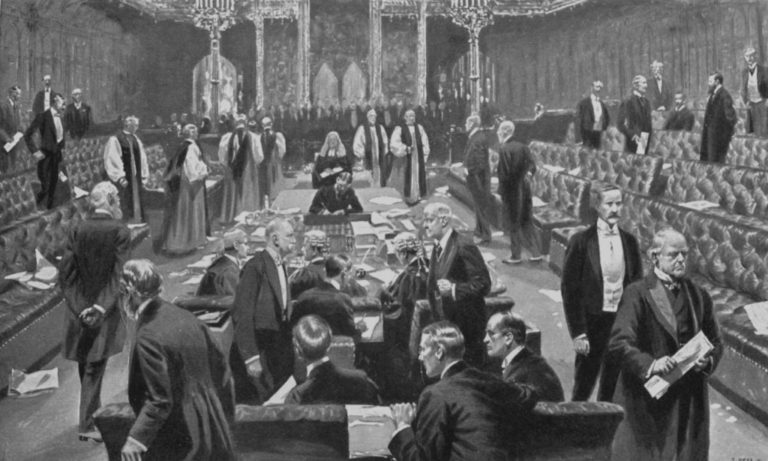Table Of Content

These institutions functioned—with varying degrees of success—as law-making bodies and law enforcement agencies throughout England during the Middle Ages. The two bodies didn’t regularly convene, but they paved the way to the bicameral legislature that exists today. The Witan was a small council of clergymen, land-owning barons and other advisors chosen by the king to discuss matters of state, taxation and other political affairs. As it expanded to include more advisors, the Witan evolved into the magnum concilium or Great Council.
Rwanda bill close to becoming law after peers abandon final battle, over monitoring committee safety amendment
Most of the men elected to the Commons had private incomes, while a few relied on financial support from a wealthy patron. Early Labour MPs were often provided with a salary by a trade union, but this was declared illegal by a House of Lords judgement of 1909. Consequently, a resolution was passed in the House of Commons in 1911 introducing salaries for MPs. The House of Commons technically retains the power to impeach Ministers of the Crown (or any other subject, even if not a public officer) for their crimes.
Sign up for the View from Westminster email for expert analysis straight to your inbox
This Los Angeles County neighborhood is close to Downtown LA, Venice Beach as well as Santa Monica, which makes it easy to commute to different parts of the city. Another thing that you’ll have easy access to in Culver City is the amazing Kenneth Hahn State Recreation Area. This outdoor wonderland features a combination of the native coastal sage scrub habitat, landscaped areas, hiking trails, and a fishing lake.

Presiding officer
The Bill passed only with the help of Labour, making the prime minister appear weak. Sunak’s decision to give Tories a free vote while appealing for their support also resulted in his party appearing divided while, in contrast, Labour whipped its MPs to put on a united front. These are the sort of seemingly naive political miscalculations from Downing Street that have many Conservative MPs fearing Sunak can lead them only to disaster in the upcoming election.
Parliament’s Power Expands
Geographic boundaries are determined by four permanent and independent Boundary Commissions, one each for England, Wales, Scotland, and Northern Ireland. The commissions conduct general reviews of electoral boundaries once every 8 to 12 years, and interim reviews. In drawing boundaries, they are required to prefer local government boundaries, but may deviate from these to prevent great disparities in electorate; such disparities are given the formal term malapportionment. The proposals of the Boundary Commissions are subject to parliamentary approval, but may not be amended. After their next Periodic Reviews, the Boundary Commissions will be absorbed into the Electoral Commission, which was established in 2000. As of 2019, the UK is divided into 650 constituencies, with 533 in England, 40 in Wales, 59 in Scotland, and 18 in Northern Ireland.
In 2006, a number of MPs attempted to revive the custom, having signed a motion for the impeachment of Tony Blair, but this was unsuccessful. Formerly, the demise of the Sovereign automatically brought a Parliament to an end, the Crown being seen as the caput, principium, et finis (beginning, basis and end) of the body, but this is no longer the case. Under the Representation of the People Act 1867 Parliament can now continue for as long as it would otherwise have done in the event of the death of the Sovereign. There is a ceremony similar to the State Opening, but much less well known to the general public.
Who is in the House of Lords? Members with backgrounds and professional experience in public life - House of Lords Library
Who is in the House of Lords? Members with backgrounds and professional experience in public life.
Posted: Fri, 12 Apr 2024 07:00:00 GMT [source]
For example, the speaker would vote against a closure motion, or the final passage of a bill, or an amendment. A debate on the legislation ran throughout Wednesday afternoon, including around a new clause from the government which would hold off outlawing Section 21s until a review of the courts system had taken place. In his Today programme interview Andrew Mitchell, the deputy foreign secretary, suggested that Rishi Sunak would use his press conference later to say how many people the government expects to sent to Rwanda later this year. Given the Westminster obsession with election timing, Sunak’s comments will also be scrutinised for any clues they offer on this. During the Q&A he dodged a question about whether the flights timetable meant he was ruling out a July election. Sunak did not engage with this argument, but he did not sound like someone planning a rush to the polls in July.
The time has now come to acknowledge the primacy of the elected house and to withdraw from the fray. The differences between Charles I and Parliament were great, and resulted in the English Civil War, in which the armed forces of Parliament were victorious.[7] In December 1648 the House of Commons was purged by the New Model Army, which was supposed to be subservient to Parliament. The unicameral Parliament that remained was later referred to by critics as the Rump Parliament, as it consisted only of a small selection of Members of Parliament approved by the army – some of whom were soldiers themselves.
Interviews, a history lesson and football: what awaits people sent to Rwanda by UK?
Whatever the reason—the expiry of Parliament's five year term, the choice of the Prime Minister, or a Government defeat in the House of Commons—a dissolution is followed by general elections. If the Prime Minister's party retains its majority in the House of Commons, then the Prime Minister may remain in power. On the other hand, if his or her party has lost its majority, the Prime Minister is compelled to resign, allowing the Sovereign to appoint a new premier. A Prime Minister may resign even if he or she is not defeated at the polls (for example, for personal health reasons); in such a case, the premiership goes to the new leader of the outgoing Prime Minister's party. Extraordinarily, the Conservative Party had no mechanism for electing a leader until 1965 and when Anthony Eden resigned in 1957 without recommending a successor, the party was unable to nominate one.
Each member is elected by, and represents, an electoral district known as a constituency. Most bills were until 2006 considered by standing committees, which consisted of between 16 and 50 members. The membership of each standing committee roughly reflected the strength of the parties in the House. The membership of standing committees changed constantly; new Members were assigned each time the committee considered a new bill.
Errant Members may be deselected as official party candidates during future elections, and, in serious cases, may be expelled from their parties outright. Ministers, junior ministers and PPSes who vote against the whips' instructions are likely to lose their positions. Thus, the independence of Members of Parliament tends to be low, although "backbench rebellions" by Members discontent with their party's policies are not that rare.
From 1988 until 1999 it was also one of the prominent attractions on the Granada Studios Tour, where visitors could watch actors performing mock political debates on the set. The major difference between the studio set and the real House of Commons Chamber is that the studio set has just four rows of seats on either side whereas the real Chamber has five. Since 1950, every constituency has been represented by a single Member of Parliament. There remains a technical distinction between county and borough constituencies; its only effects are on the amount of money candidates are allowed to spend during campaigns and the rank of the local authority co-opted Returning Officer who presides over the count.
The Rwandan judge, Judge Rugege, is an enormously distinguished and respected international jurist. After the Afghan was was over, we set up a safe and legal route for those Afghans who had served the British Army, served Britain, the Arap (Afghan Relocations and Assistance Policy) scheme, and 16,000 Afghans have been settled in Britain as a result. For that reason, we simply don’t think this amendment is necessarily … We’re not in the business of cluttering up the statute book with unnecessary legislation.

No comments:
Post a Comment